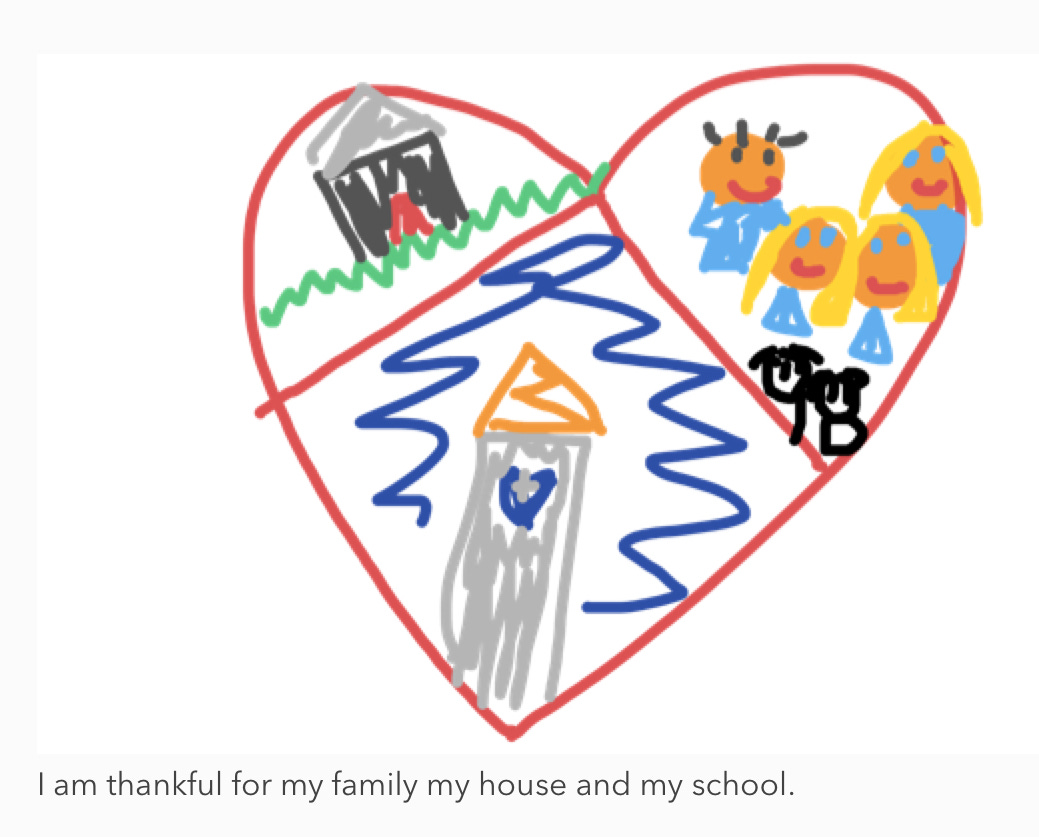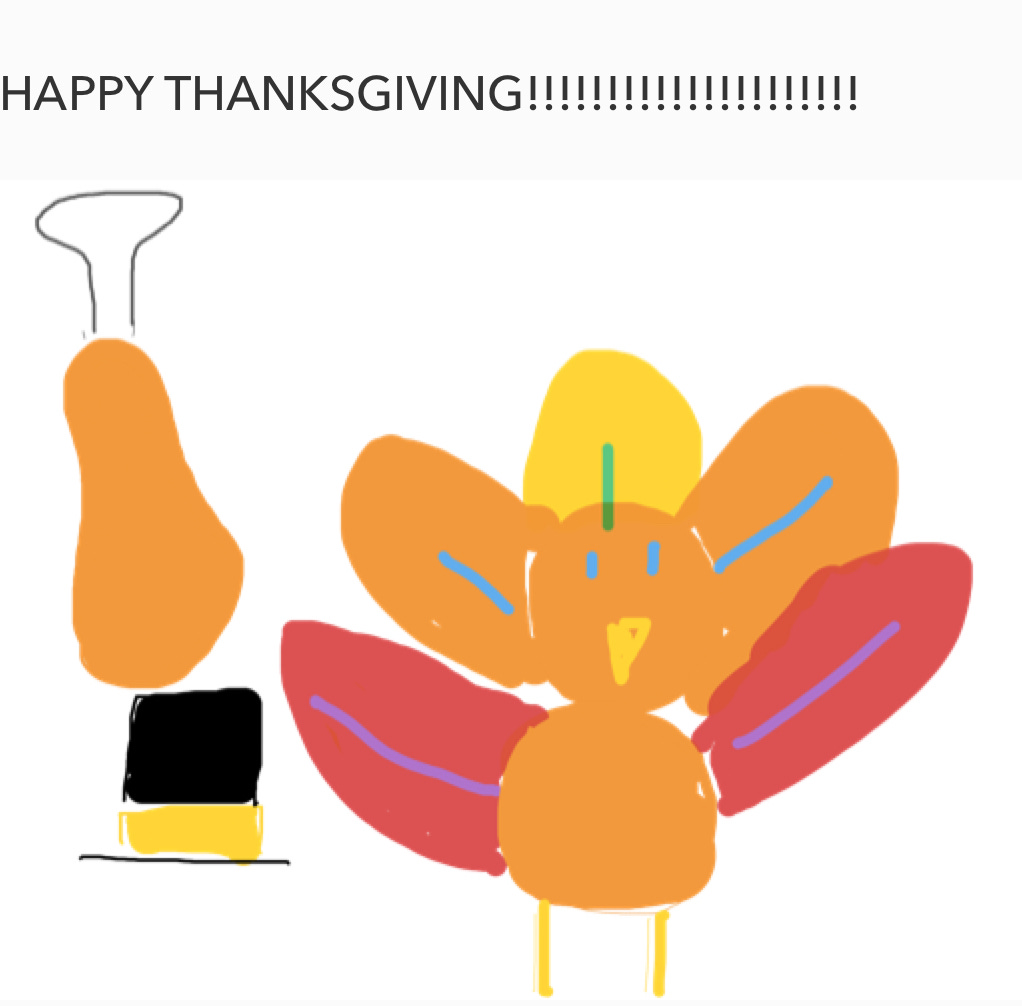Thanksgiving Reflections
Readings to elevate our grateful hearts
Every Thanksgiving, I read a few reflections on the holiday. Usually, I start with a poem from Wendell Berry:
It is late November, Thanksgiving,
and the slow rain falls as all day
it has fallen. The mists drift
in the treetops along Camp Branch.
The ewe flock grazes the green slope
as in a dream of a painting
by Samuel Palmer. There is no wind.
It is completely quiet. From the distance
comes only the sound of the branch
flowing in its wooded hollow, old,
old, and new, unidentifying the day
and the man giving his thanks.
From This Day: Collected and New Sabbath Poems 1979-2012. Copyright © 2003 by Wendell Berry. Used with the permission of The Permissions Company, LLC on behalf of Counterpoint Press, counterpointpress.com.
It begins with phenomena that distort our vision. Mist. Slow rain. Then Berry dives directly into a dream – “as in a dream of a painting” – a distortion of a distortion of reality, as if we have entered a place we cannot grasp or see fully. We see but cannot see.
He mentions the British landscape painter Samuel Palmer. How curious to include a British painter in a poem clearly about America and our timing of Thanksgiving.
The line “It is completely quiet” is sandwiched between two pieces of evidence that it clearly is not completely quiet. the forest tings with the sound of the rain from early in the poem. And then “comes only the sound of the branch flowing” – merely one sound and yet a refutation of the assertion “completely quiet.” Again, Berry distorts our sense of reality.
The branch is “old, old, and new.” I have always wondered whether Berry means “old as creation;” “old as the man can remember;” and “new in the sense the branch and woods undergo constant change.” Those are my answers to the mystery of those adjectives, but still I ponder.
I read this poem and a sense of mystery overcomes me. Unanswered questions about the author’s decisions permeate the poem and the scene invoked. And sometimes I wonder if Berry is holding a mirror to the mystery of creation, and suggesting that in the midst of that mystery, we should do as the man does, and give our thanks.
—
Every Thanksgiving since 1961, the Wall Street Journal has published two editorials. They always lift me up, despite the struggles I face in life and the difficulties that beset our nation.
“The next day they went on board, and their friends with them, where truly doleful was the sight of that sad and mournful parting, to hear what sighs and sobs and prayers did sound amongst them; what tears did gush from every eye, and pithy speeches pierced each other’s heart, that sundry of the Dutch strangers that stood on the Key as spectators could not refrain from tears. But the tide (which stays for no man) calling them away, that were thus loath to depart, their Reverend Pastor, falling down on his knees, and they all with him, with watery cheeks commended them with the most fervent prayers unto the Lord and His blessing; and then with mutual embraces and many tears they took their leaves one of another, which proved to be the last leave to many of them.”
My eyes always fixate on this paragraph. After four centuries, we may find it difficult to imagine staking our lives and our family’s future on such a bold and overwhelming uncertain endeavor. Have I ever made such a consequential action? Could I? Do such moments exist for us today? And if they do, could I actually reach into the void and then take an irretrievable step? And yet they did. We should feel thankful they did.
“How can they turn from melancholy when at home they see young arrayed against old, black against white, neighbor against neighbor, so that they stand in peril of social discord. Or not despair when they see that the cities and countryside are in need of repair, yet find themselves threatened by scarcities of the resources that sustain their way of life. Or when, in the face of these challenges, they turn for leadership to men in high places—only to find those men as frail as any others.
“So sometimes the traveler is asked whence will come their succor. What is to preserve their abundance, or even their civility? How can they pass on to their children a nation as strong and free as the one they inherited from their forefathers? How is their country to endure these cruel storms that beset it from without and from within?
….
“And we might remind ourselves also, that if those men setting out from Delftshaven had been daunted by the troubles they saw around them, then we could not this autumn be thankful for a fair land.”
Was this written in 1961 or 2022? I cannot tell, for it so well tells the story of our present discordant sentiments and struggles. Perhaps we should take comfort in that reminder that most ages will not seem peaceable and easy to we who live in those days. May we also, this Thanksgiving - and every – not feel daunted by the troubles we see around us.
—
In 1789, President George Washington proclaimed a national day of Thanksgiving. Each year, I find it worthwhile to pause and reflect on his words.
“And also that we may then unite in most humbly offering our prayers and supplications to the great Lord and Ruler of Nations and beseech him to pardon our national and other transgressions-- to enable us all, whether in public or private stations, to perform our several and relative duties properly and punctually--to render our national government a blessing to all the people, by constantly being a Government of wise, just, and constitutional laws, discreetly and faithfully executed and obeyed--to protect and guide all Sovereigns and Nations (especially such as have shewn kindness unto us) and to bless them with good government, peace, and concord-- To promote the knowledge and practice of true religion and virtue, and the encrease of science among them and us--and generally to grant unto all Mankind such a degree of temporal prosperity as he alone knows to be best.”
Washington, less than a year into his Presidency, asks God “to pardon our national and other transgressions.” He knew that no person, and thus no government, can do no ill, even with the noblest of intentions. And I wonder if, even then, he had one particular national transgression in mind.
To a modern reader, his imploring God “To promote the knowledge of true religions” and also to “promote…the encrease of science” seems at odds. Didn’t Darwin and Nietzsche kill God? Yet I attended a college whose motto “Utraque Unum” – “Both are One” – suggests otherwise. And those wise Jesuits, along with wise Washington, perhaps grasped a truism we would be wise to reclaim.
—
President Abraham Lincoln proclaimed a day of Thanksgiving for the nation in 1863. I prefer the language of his proclamation of 1864. It reads in full:
October 20, 1864
By the President of the United States of America
A Proclamation
It has pleased Almighty God to prolong our national life another year, defending us with His guardian care against unfriendly designs from abroad and vouchsafing to us in His mercy many and signal victories over the enemy, who is of our own household. It has also pleased our Heavenly Father to favor as well our citizens in their homes as our soldiers in their camps and our sailors on the rivers and seas with unusual health. He has largely augmented our free population by emancipation and by immigration, while He has opened to us new sources of wealth and has crowned the labor of our workingmen in every department of industry with abundant rewards. Moreover, He has been pleased to animate and inspire our minds and hearts with fortitude, courage, and resolution sufficient for the great trial of civil war into which we have been brought by our adherence as a nation to the cause of freedom and humanity, and to afford to us reasonable hopes of an ultimate and happy deliverance from all our dangers and afflictions:
Now, therefore, I, Abraham Lincoln, President of the United States, do hereby appoint and set apart the last Thursday in November next as a day which I desire to be observed by all my fellow-citizens, wherever they may then be, as a day of thanksgiving and praise to Almighty God, the beneficent Creator and Ruler of the Universe. And I do further recommend to my fellow-citizens aforesaid that on that occasion they do reverently humble themselves in the dust and from thence offer up penitent and fervent prayers and supplications to the Great Disposer of Events for a return of the inestimable blessings of peace, union, and harmony throughout the land which it has pleased Him to assign as a dwelling place for ourselves and for our posterity throughout all generations.
In testimony whereof I have hereunto set my hand and caused the seal of the United States to be affixed.
Done at the city of Washington, this 20th day of October, A.D. 1864, and of the Independence of the United States the eighty-ninth.
ABRAHAM LINCOLN.
By the President: WILLIAM H. SEWARD, Secretary of State
The words “reasonable hopes of an ultimate and happy deliverance from all our dangers and afflictions” strike me. Lincoln does not implore God for victory, only “reasonable hopes.” He does not seek God’s wrath on the people of the South. He asks for “a return of the inestimable blessings of peace, union, and harmony throughout the land.” I think of this sentiment when I wish ill upon people who have injured me or simply believe in a different vision of the common good than I do.
Lincoln also asks his fellow citizens to “reverently humble themselves in the dust.” I do not think he means this merely metaphorically. He means it literally, to the word, so that we might know what it feels like to be meek and low and beneath all except the firmament. Certainly far, far below God and the mysteries of Heaven. He means us to see the universe and ourselves differently in the dust as we give thanks than we do in the usual course of our lives.
—
Finally, I always find this 1939 Thanksgiving proclamation by President Franklin Roosevelt distinguished:
“More than three centuries ago at the season of the gathering in of the harvest, the Pilgrims humbly paused in their work and gave thanks to God for the preservation of their community and for the abundant yield of the soil. A century and a half later, after the new Nation had been formed, and the charter of government, the Constitution of the Republic, had received the assent of the States, President Washington and his successors invited the people of the Nation to lay down their tasks one day in the year and give thanks for the blessings that had been granted them by Divine Providence. It is fitting that we should continue this hallowed custom and select a day in 1939 to be dedicated to reverent thoughts of thanksgiving.
“Our Nation has gone steadily forward in the application of democratic processes to economic and social problems. We have faced the specters of business depression, of unemployment, and of widespread agricultural distress, and our positive efforts to alleviate these conditions have met with heartening results. We have also been permitted to see the fruition of measures which we have undertaken in the realms of health, social welfare, and the conservation of resources. As a Nation we are deeply grateful that in a world of turmoil we are at peace with all countries, and we especially rejoice in the strengthened bonds of our friendship with the other peoples of the Western Hemisphere.”
Roosevelt grounds his Proclamation in the tradition of his predecessors. He does not start this tradition; like a caretaker, he holds it and passes it on to future guardians.
Like Washington and Lincoln, Roosevelt gives his Proclamation in the backdrop of war. Germany had invaded Poland less than two months before he issued it. Barely two more Thanksgivings would pass before America would find itself engaged in that war. I wonder if Roosevelt, in his moments of undisturbed reflection, knew America could not remain at peace amidst a world at war. Here, he grasps at peace and the peace America might have, however long it might linger. And he clings to a hope that America might have peace “with all countries.” Perhaps Washington suspected we would one day be guilty of fomenting unrest and war outside our borders, hence seeking forgiveness for our national transgressions. And yet peace with all countries remains the beacon call, the hope of America.
—
One final reflection. Reading them, I find latent in them a theme of energy and action. We feel the energy of the Pilgrims departing their home for the dangerous journey across the vast Atlantic Ocean, seeking a new home. Washington, Lincoln and Roosevelt all write in a context of action – war, industry, farming, building and exploring. In some ways, I find the “man giving his thanks” in Berry’s poem the epitome of a life of energy and action – reflecting on his life, making sense of it, and giving thanks to have it.
—
May this Thanksgiving find you joyful, at peace with what was, in hope for what may be, and thankful for beauty, spirit and truth. From me and my family to you and yours, Happy Thanksgiving!
My sincere thanks to DJ May and Chris Angelis for reviewing this article and making (extremely) helpful suggestions for improvement.







I love Cordelia's additions!